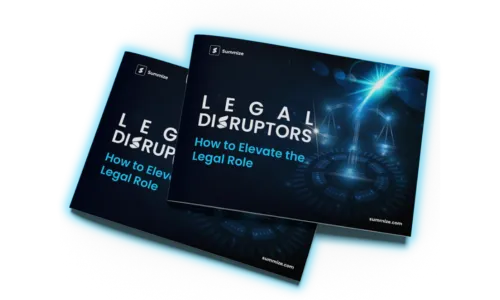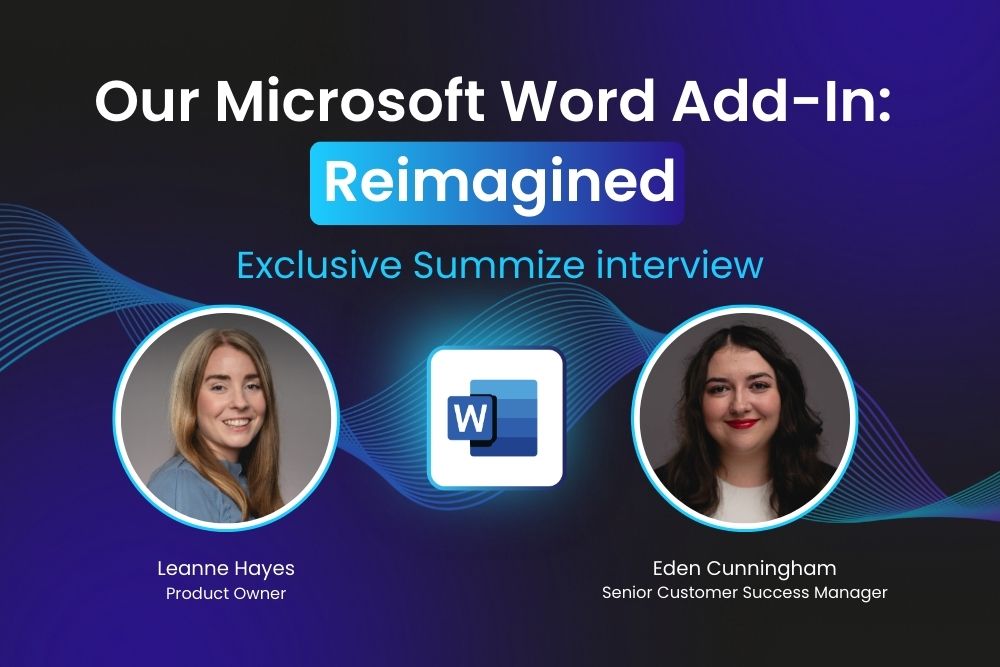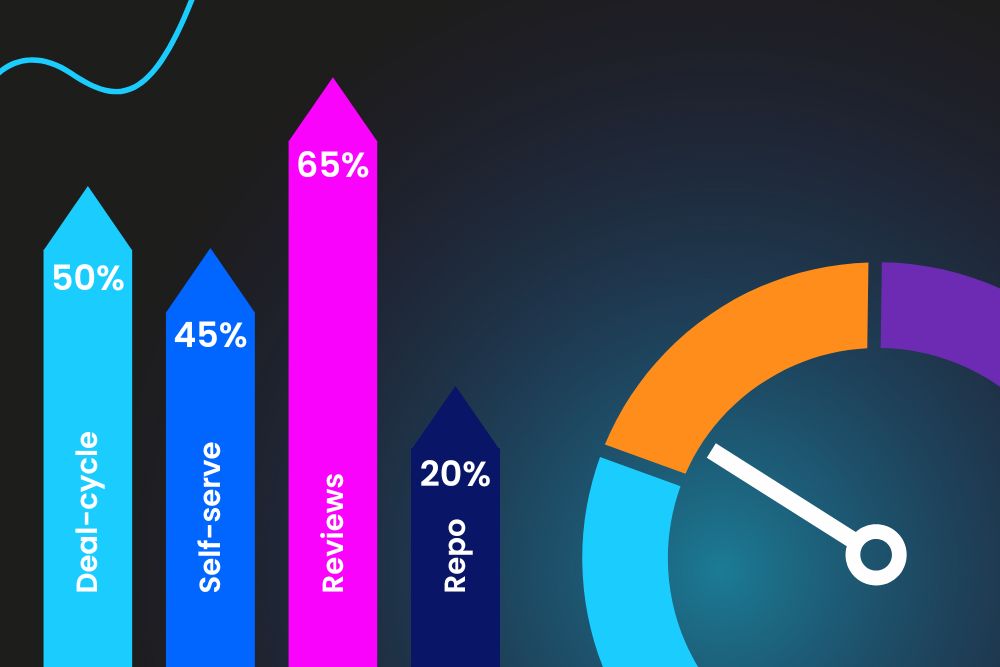Learnings from 3 CLM implementations: Summize & Nsight
We sat down with Nsight to discuss what they learned from three CLM implementations and what led them to success with Summize.
September 26, 2023
November 26, 2025
Nsight are a leading telecommunications founded in 1910, based in Wisconsin. We sat down with Nsight to discuss their learnings from three CLM implementations and what led them to success with Summize. You’ll also find their top tips at the end of this article, super useful for anyone embarking on their own CLM journey. You can also listen to the conversation in full on our Legal Disruptors podcast.
Larry and Susan Roberts are hugely experienced legal professionals. Larry has 32 years’ experience as the company’s attorney, while Susan has 40 years’ experience in private practice before she made her way to corporate law and joined the team seven years ago.
Larry’s journey to first selecting a CLM solution came about when he was analyzing outside counsel bills and noticed that a large amount of the budget was being spent on contracts, as all notices in the contracts were going to their outside counsel.
The real trigger though came when the company’s lack of contract insights led to several autorenewals of multi-year store leases, because no one had visibility of the dates in the contract. Realizing that individuals in the business managing their own contracts was inefficient, and costing the company money, Nsight embarked on a solution that would at least centralize their contracts in one place and reduce the risk of missing future renewals.
Susan faced the task of getting all the company’s contracts (around 15,000) into the system – a difficult challenge when they were stored all over the place and in different formats, including paper-based that needed scanning. As a telecoms company, for Nsight these are mostly service contracts e.g. tower contracts and vendor contracts.
After a time-consuming process of collating them, this was a step forward in terms of tracking dates, moving away from a spreadsheet and into their first contract management system. Regaining control of the terms and conditions and moving away from a world where individuals were agreeing to contract terms outside of the legal department was the first step on the journey.
Nsight had quickly realized two immediate benefits of CLM:
- Visibility of deadlines and due dates
- Control over terms and conditions
This first experience with a contract repository met their requirements for a couple of years, when it became apparent that their needs had outgrown the capabilities of the system.
Adopting a CLM
Nsight then embarked on selecting a more advanced contract solution, and moved to an established US-based CLM where they were wowed by some of the features shown in the demo, but found themselves disappointed with the implementation and support process.
Unfortunately, they were unable to migrate their legacy contracts to the new system and therefore they found themselves in a situation of having to use two different contract systems for a year so that they didn’t lose access to them during this period. They were also unable to migrate 2,000 tasks which had been set in the previous system, leaving the Nsight team to revert back to manual processes. Reading contracts, establishing renewal terms and termination terms was all very time-consuming work, and frustrating after such an investment of time and money. Once again, Nsight decided to go back out to market for a better solution to meet their requirements, but this time with a much clearer view of what they needed and how they’d want the implementation process to work.
Third time lucky?
This time, in 2023, the Nsight team were very clear on their requirements for a CLM given their prior experiences, which made the selection process much easier. After evaluating several CLMs against their specific use cases and needs, Summize was selected as the one that would be the best fit.
“After two previous CLM solutions we’d looked at quite a few other contract management programs, and we were impressed with a lot of them. But then we had the demo with Summize, and it literally blew us out of the water. And we actually thought this is too good to be true! But it ended up being such a blessing. The onboarding and transition has been so smooth, we’ve been so pleased with the support, and having the program do all the things and more that we expected, or that we hoped for.“
With Summize they are even able to benchmark contract clauses and find anywhere they would have previously agreed to certain terms (for example California as governing law) which could be renegotiated upon renewal. This has saved even more time for legal and also ensured the department retains control and visibility of the detail within the contracts being signed.
The team particularly likes the user experience of Summize, calling out its intuitive and logical approach. Speaking to her own experience, Susan says:
“I was looking for hidden ways to find things, or to have it do what I wanted it to do. And instead, they were right there. It was so obvious that I missed it. Because I expected to have to go through 17 different little steps to get to where I wanted to go. And it was almost embarrassing, because I would find out from your team that it was, ‘Oh, it’s just this? Right where it says this’ You click on it, and that’s what it does. So for me, it’s so logical, the way it’s set up. And that’s been such a benefit.”
“I feel so good with the decision we made, because I feel it was completely an educated and well thought out and researched decision. And again, it checked all our boxes. We didn’t have any of the problems that we had the last time.
Tips from Nsight for successful CLM use
- Figure out who’s going to be your super user - Who’s going to be your number one primary user, and make sure you involve them 100% in that process to make sure they are happy with the solution. If it doesn’t work for them, then it’s not going to work for you. “You may have the greatest CLM in the world. But if the person that uses it the most isn’t happy with it, they’re not going to use it as much as they could.”
- Be really clear about what you are looking for from a solution – Write down a list of everything you expect and have the vendor show you how it delivers against these requirements. This should include specifics on what you need the program for, and how you intend to use it.
- Know what’s out of scope - to be told what the solution cannot do is just as important. You need to have a really solid understanding about what a company can and cannot do for you.
- Ignore the bells and whistles that the vendor wants to highlight for you - Make sure that the person that’s going to use it the most understands exactly how the feature works and is ready to use it. “A CLM that has features that you love and are going to use all the time is great. But if you don’t use them, then it’s really not of great value to the organization. I will admit that when we went from our first one to our second one, a lot of the bells and whistles were like, “that is so cool. I never thought of that.” And we didn’t use them in three years. It was like I got suckered into the shiny object, when I really should have been focused on “Here’s what we do, and here’s what we need it to do.”
- Engage the business - For example, sales / commercial users will appreciate that deadlines related to contracts are not sitting with them anymore. Send out reminders and share the details – most are really pleased that legal is providing this service. Add reminders for your internal stakeholders to share contracts with legal – for example in your email signature – so everyone understands the importance of contracts to the whole business.
- Make sure you take time for the implementation - It’s so important to make the time to get it right from the start and to be ready internally. “Because once you’ve got it in, it’s really hard to go backwards and try to do it again.”
Ready to experience Summize?
Simplify and accelerate the entire contract lifecycle without replacing existing ways of working. Book a demo with us today to see the potential!
Discover even more!
Explore more about contracting and CLM in our ultimate contract guides








